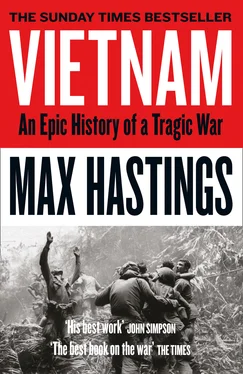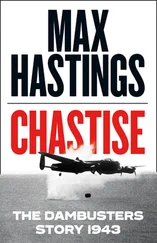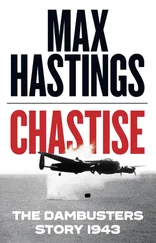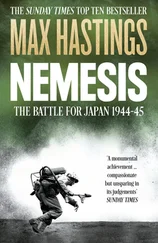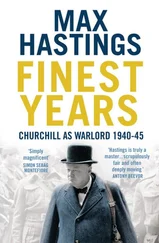There were two main documents constituting the Geneva Accords. The Agreement on the Cessation of Hostilities was signed on 21 July 1954 by the French and the North Vietnamese. The Final Declaration of the Geneva Conference was verbally endorsed by the French, the British, the Chinese and the Russians. Dulles issued a statement emphasising his nation’s special interest in the fate of the newborn twins: he warned that any violation of the deal’s terms would be ‘a matter of grave concern and seriously threaten international peace and security’. Everyone involved save the Americans gave credit to Anthony Eden for his performance as co-chairman, through many weeks when the talks seemed doomed to fail. An eyewitness wrote of his ‘almost inhuman good humour and patience’: this was the finest hour of the career as a statesman of the brilliant, unstable, absurdly handsome British foreign secretary.
The Geneva Accords, as they became known, merely settled terms of truce between the departing French colonialists and the communists who were to assume governance of the North. Therein lay the basis for the later insistence of both Washington and Saigon that refusal to conduct national elections within the specified two-year time frame was no breach of anything to which either had consented. Many people around the world quickly understood that though the outcome of Geneva was distasteful, nothing more palatable was on offer. The Spectator editorialised on 23 July: ‘This is a bad peace. It is almost certainly the best peace that could, in the circumstances, be obtained.’ The magazine went on to speculate that the communist bloc had curbed its demands because of fears roused by Washington’s sabre-rattling. ‘It would seem to follow that the United States, with its wild, ugly and undisciplined grimaces, has nevertheless indirectly contributed to the conclusion of peace.’
Eisenhower and Dulles thereafter invested the new semi-nation with a legitimacy and importance rooted in the need to calm their Republican constituency at home, and to restore the administration’s self-esteem after failing to save the North. South Vietnam, said the secretary of state, might yet prosper ‘free of the taint of French colonialism’, through the instrumentality of Ngo Dinh Diem, a figure whom Washington embraced with an enthusiasm that was somewhat startling, given that the Americans knew little of him. The British saw matters differently: they had consistently refused to associate themselves with engagement in Indochina, because they saw no vital interest at stake there. They believed the West had its hands full confronting the Soviets in Europe. Meanwhile the Russians and Chinese were reflexively willing to provide some assistance to North Vietnam, now a fellow-socialist state. They would be gratified if the Americans failed in an attempt to make South Vietnam a capitalist showcase, but had no appetite for making Indochina the scene of a high noon between East and West.
The Vietminh went home from Geneva convinced that Zhou Enlai had double-crossed them, yet Ho Chi Minh accepted that hegemony over all Vietnam must be deferred for a season. When North–South elections took place, he could be confident that unification would follow. For the present, he and his comrades addressed themselves with ruthless single-mindedness to building the socialist state of which they had dreamed for so long, into which the South would soon be subsumed. Although the Vietminh had displayed a tenacious appetite for armed struggle, by 1954 its leaders must have been grateful at last to sleep on beds under roofs with their families; to eat half-decent food; to live and work without fear of interruption by bombs or shells.
No Westerner regarded Geneva as a success story, instead it was seen merely as an exercise in damage limitation, as is most Big Power diplomacy: its achievement was to extricate an exhausted colonial power from an unwinnable war. Yet what was extraordinary about the Accords was that the new Saigon government got so much, the triumphant Vietminh so little. This was because the Russians and Chinese were far less interested in the fate of Indochina, and explicitly of Vietnam, than Washington’s Cold Warriors supposed. Mao Zedong had no wish to see an over-mighty communist Vietnam on his doorstep, and appears to have been anxious to draw Laos and Cambodia into his own sphere of influence, rather than that of Ho Chi Minh.
A general ceasefire took effect on 27 July, pending the temporary partition of Vietnam. After years living at COSVN’s secret headquarters in the Mekong delta, COSVN secretary Le Duan emerged to start his travels across the South on a hand-pumped railway trolley. In the North the communists assumed control. On 9 October the French Army left Hanoi, marking the occasion with a series of defiant, vainglorious military ceremonies which caused an American spectator to think of Don Quixote. Amid a roll of drums, boomph of brass and clash of cymbals, Gen. René Cogny, ringmaster for Dienbienphu, saluted the flags of regiments that had fought – paras , Legionnaires, Marines, Senegalese, North African, together with armoured columns that chewed the soft tarmac of Hanoi’s streets. France’s departure was characterised not by nobility and generosity, but instead by a spiteful scorched-earth policy: the colonials removed or destroyed everything that might be of value to the victors.
Ten-year-old Doan Phuong Hai thought the trumpets of the French quitting Hanoi ‘so sad that they seemed to be sobbing’. Their flag was lowered for the last time over the citadel on a cold, blustery, wet afternoon. Two NCOs folded the sodden tricolor , then presented it to the presiding general, who in turn passed it to the garrison commander. Rain masked the tears of many officers and men as the band played the Marseillaise . Then the garrison boarded its trucks and drove away towards the coast. It was just seventy-five years since the colonial power had assumed governance of the city.
The departing French were first replaced by representatives of the International Control Commission, ‘Indian Army officers with swagger sticks and bristling Guards mustaches, pale-faced Poles in their odd triangular caps, and beer-drinking Canadians speaking their own puzzling brand of French’. They in turn were followed by the victors, the first elements of Giap’s army. In Howard Simpson’s words: ‘They came forward in two files, one on each side of the street, small men in drab uniforms wearing leaf-woven, cloth-covered helmets fitted with camouflage nets. Loaded down with weapons and equipment, the Bo Doi of the 308th Division were entering an environment totally unfamiliar. Their approach was heralded by the soft shuffle of hundreds of feet in cheap tennis shoes: the Vietminh entry into Hanoi thus proved one of the most silent victory marches in the history of the world.’ Peasant soldiers gawked in wonder at the grand buildings and broad avenues, booty of their struggle. They were watched by crowds who displayed an enthusiasm that was not entirely spontaneous: cadres had for days toured the city, persuading its hesitant citizens that it would be in their interests to cheer the victors.
Among the handful of Americans present was big, clunky Major Lucien Conein – ‘Black Luigi’, ‘Lou-Lou’ or ‘Three-Finger Lou’ – an American born in France who had returned to his birthplace in 1939 to share the French defeat, then served with the OSS in Europe and southern China. As leader of Col. Edward Lansdale’s US military advisory group in North Vietnam, he was now charged with organising stay-behind teams. Conein was a caricature of a semi-secret warrior – hard-drinking, tough, outspoken, often outrageous: he once expressed his exasperation with a stalled automobile engine by emptying a .45 pistol into it. Now, in the midst of the throng of Vietminh shuffling by, he suddenly punched the air and shouted in Vietnamese, ‘Long live Ho Chi Minh!’ This won him a cheer from surrounding communists, who failed to perceive that he was mocking them – as he would continue to do through the years that followed.
Читать дальше
